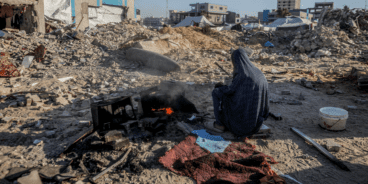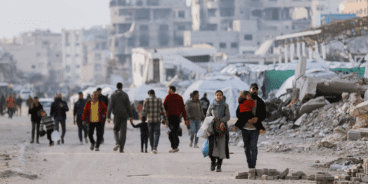
Joint Letter to the UN Security Council Regarding an International Military Force for Mali
Dear Ambassador,
As you consider the authorization of an international military force for Mali, we would like to share our concerns about the possible human rights challenges such a force could encounter if it is not accompanied by the proper safeguards for civilian protection and human rights monitoring capability.
As the United Nations Secretary-General has recommended in his report pursuant to Security Council Resolution 2071 of October 12, 2012, practical measures, such as the deployment of human rights observers, would help mitigate the risk of further abuses being committed while the international force is assisting the Malian armed forces.
Populations in the north of Mali are already suffering violations from combatants on all sides: armed Islamist groups have enforced their interpretation of Sharia law through beatings, amputations, killings, and the destruction of religious landmarks. Separatist Tuareg rebels were responsible for numerous cases of sexual abuse and widespread pillage. Malian soldiers have arbitrarily detained and in many cases tortured and summarily executed alleged rebel collaborators and members of rival military units. All warring factions in the north have committed extrajudicial killings, arbitrary arrests, and looting, and have recruited and used child soldiers.
Because of this challenging environment, we believe that important lessons should be learned from the deployment of the African Union Mission in Somalia (AMISOM). Much like the current situation in Mali, the Security Council mandated a regional force in Somalia to retake large swaths of territory from armed Islamist groups, offering significant financial and logistical support to the international force. At the time, the Council did not mandate the deployment of a strong and well-staffed human rights mission to monitor and report on adherence to international human rights and humanitarian law by all parties to the conflict.
Although some human rights monitors were eventually deployed as part of the United Nations Political Office for Somalia (UNPOS), their insufficient number and the difficulties they encountered in deploying on the ground meant that the Security Council was unable to rely on them to address allegations of wrongdoings. This undermined the Council’s ability to ensure that its engagement was not having an adverse impact on the population. With few independent observers present, Somalia effectively became an accountability-free zone for AMISOM troops and the various armed actors involved in serious abuses, including the Transitional Federal Government (TFG) and al-Shabaab, as well as many militias.
In fact, since being deployed in 2007, there have been repeated allegations of the use of indiscriminate fire on populated areas by AMISOM troops resulting in numerous civilian casualties. While these laws- 2 of-war violations were widely reported by human rights organizations, AMISOM’s leadership denied them until 2011, and troop-contributing countries largely failed to hold their troops accountable. These abuses undermined the support AMISOM received from local populations and thus its capacity to fulfill its mandate.
Compounding the problem in Mali is that an international force would have to conduct operations handin-hand with a weak, fractured, and undisciplined Malian army, which contains units and officers implicated in serious abuses. One such example is the Malian government’s recent appointment of coup leader Capt. Amadou Sanogo as the head of the army reform committee, despite the alleged implication of forces under his command in extrajudicial killings, torture, and enforced disappearances. This poses a particular threat to the respect for human rights and international law in the context of a UN-supported intervention, as Captain Sanogo would be a natural interlocutor for the UN-backed force.
We therefore welcome the Secretary-General’s undertaking to take “immediate steps to strengthen the United Nations presence in Bamako with a strong human rights capacity.” We fully support his recommendation that “the deployment of a sufficient number of United Nations human rights observers should be mandated to monitor strict adherence to international humanitarian and human rights law, to advise on ways to mitigate any adverse impact on the civilian population, and to report publicly in this regard.” We also support his recommendation that, should the Security Council authorize the proposed African-led International Support Mission for Mali (AFISMA), the Council would need to “play an active role in ensuring the African-led forces and Malian forces engaged in any offensive military operations in the north are held fully accountable for their actions.” As mentioned in the Secretary-General’s report, “the effective training of military and police personnel of both AFISMA and the Malian forces in their obligations under international human rights, humanitarian and refugee law” will be key.
In the last two years, the UN has developed the Human Rights Due Diligence Policy on UN support to non-UN security forces. This policy was designed precisely to ensure that “UN support cannot be provided where there are substantial grounds for believing there is a real risk of the receiving entities committing grave violations of international humanitarian, human rights or refugee law.” In this regard, we welcome the Secretary-General’s recommendation that “any support by the United Nations to AFISMA or the Malian armed forces would have to be provided in strict compliance with the United Nations Human Rights Due Diligence Policy (HRDDP), which is intended to contribute to the protection of civilians while enhancing the effectiveness of non-United Nations security forces that receive United Nations support.” Therefore, consistent with the recommendations in the Secretary-General’s report on the situation in Mali, we would urge you to incorporate the following measures into the mandate of any international military operation that the Security Council may adopt to restore the territorial integrity and unity of Mali:
- Mandate the deployment of a strong and well-staffed team of UN human rights observers alongside the international military force. The human rights component should have adequate security, logistical, and operational support, and be deployed within the UN peacekeeping budget. The team should monitor adherence to international humanitarian and human rights law, and report publicly and regularly to the Security Council on its findings and recommendations. It should also provide appropriate human rights training to contingents from troop-contributing countries, as well as the Malian armed forces.
- Include in the mandate of the international force the need to develop rules of engagement that make minimizing harm to civilians and civilian populations a priority during military operations. Recommend that the international force include military lawyers with battlefield experience in the laws of war.
- Reaffirm in the mandate of the international force that any UN support to the international force or Malian security forces should be subjected to strict vetting procedures as described in the HRDDP.
- Commit to ensuring that all credible allegations of violations of international human rights and humanitarian law by all parties, including the international force, are promptly, thoroughly, independently, and impartially investigated in accordance with international law and standards.
Additionally, in the event the Prosecutor of the International Criminal Court (ICC) decides, according to the Rome Statute, to open an investigation in Mali, we urge the Security Council to require the international force to provide the court with full cooperation, including locating witnesses and evidence, effectively safeguarding witnesses, intermediaries, and all others connected with the investigation, and immediately arresting and promptly turning over persons named in any arrest warrants.
We hope that these recommendations will be reflected in the resolution the Security Council may ultimately adopt in relation to Mali, and we would be pleased to discuss these issues further.
Sincerely,
- Amnesty International
- FIDH
- Global Centre for the Responsibility to Protect
- Human Rights Watch
Related Content


Atrocity Alert No. 434: Sudan, Ethiopia and the UN Human Rights Council
